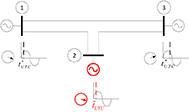Spoofing GPS Receiver Clock Offset of Phasor Measurement Units
Xichen Jiang with adviser A. Domínguez-García
The current power system is undergoing radical changes to meet new Smart Grid standards. These standards involve integrating new technology, which increases system complexity and adds uncertainty. Reliability is a pivotal issue. One tool receiving considerable attention is synchronized PMUs, which are synchronized through Navstar GPS signals and provide wide-area measurements in power systems. They allow for real-time state estimation and power grid monitoring.
This research involves developing a data level spoofing method that can cause PMUs to lose synchronization. An attack is conducted by changing the GPS ephemerides data, which causes the receiver to compute an incorrect receiver clock bias while keeping the same position. Such an attack invariably results in errors in the power system state estimation, impacting system stability monitoring. Figure 28 illustrates the effect of spoofing on the phase measurements provided by the PMU of bus 2. An incorrect phase is measured by the PMU as a result of the GPS signal spoofing. The nominal values for the receiver location and clock correction are computed using MatLab. Then, an optimization problem for the maximum time shift of the clock correction is formulated and computed. Results show that a maximum time shift of 8 ms for the clock correction is possible. This corresponds to a half-cycle phase shift. The effect of GPS spoofing on a power system voltage stability algorithm is also provided. This research is supported by the National Science Foundation grant NSF ECCS 09 54420 CAR.
This research is funded by the Grainger Center for Electric Machinery and Electromechanics.
